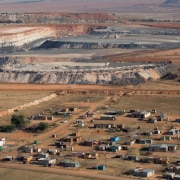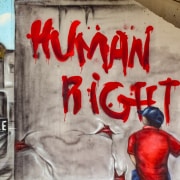|
Getting your Trinity Audio player ready...
|
Corruption Watch (CW) has put out a call for research and policy papers in relation to its Project Larona, an initiative that aims to help address income and wealth inequality related to land rights, land reform, and access to natural resources, by ensuring that those living in traditional areas are able to have a greater say over the decisions affecting their land. Vulnerable communities’ livelihoods and the right to claim compensation is often tied to the recognition of land rights.
The overarching theme of the research is Leaving No-one Behind.
The deadline for the application and abstract is the close of business on 3 July 2022. Full drafts must be submitted by 30 December 2022, and final papers are due by 28 February 2023. CW envisions the development of a book from the series of working papers submitted.
To apply, please provide:
- A short document of around three (3) pages setting out the area you wish to research, why you want to do it, your background and experience to do the research paper, the methodology you will follow, and anything else you think will be important for your application.
- A 750-word abstract of your topic (please include references but do not count the references in your word total).
- A current curriculum vitae.
- Two of your single authored research papers or publications electronically (if you have i.e. a published paper, paper for a course, thesis, published article, etc).
Please send the aforementioned documents to admin@corruptionwatch.org.za with the subject line “Project Larona Research Papers” by 17h00 (SAST) on 3 July 2022.
Download the full research brief.
Background
Project Larona falls under the European Union Rallying Efforts to Accelerate Progress project (EU REAP), a multi-jurisdictional initiative which commenced in July 2021. It is led by the Transparency International Secretariat and funded by the European Commission (EuropeAid). EU REAP focuses on directly supporting groups at the intersection of income, wealth and social inequalities, who have been among those most left behind in Kenya and South Africa, and more broadly in Africa.
CW is taking the lead on EU REAP interventions in South Africa – these will focus on the creation of platforms for land right holders in mine-affected areas, so they may actively participate in decision-making processes that affect their land, property, environment and livelihoods. This includes research, advocacy and public outreach initiatives throughout the project’s life. For meaningful change to occur in these sectors, opportunities need to be given to communities and groups needs to be engaged and make significant contributions. Thus, key issues are what strategies and means need to be adopted to combat these problems.
Research focus
An aim of the project is to develop a series of working papers that are a combination of research and policy which could later become a book. The intent is to develop materials for law and policy makers, judicial officers, private sector actors, civil society organisations, and so on, to be able to analyse significant policy issues in land reform and natural resource governance, with a view of offering constructive solutions.
The research is meant to be a combination of theory and praxis in each area that is to be researched as laid out in the full research brief. Each paper should ascertain the problems, which are the various communities that are suffering and affected by the specific area being researched, and then advocate for legal and policy reform to promote those from traditional communities being better able to participate in the various decision-making processes.
The research is to be conducted through the lens of strengthening of democracy, addressing corruption vulnerabilities, and the protection of human rights. This is to promote the overarching theme of addressing income and wealth inequality related to land rights and mining, among others. This includes land reform, access to natural resources, as well as creating mechanisms for those living in traditional communities to be able to participate in decisions affecting their land and to claim their right to compensation if they have to leave their land and so on.
Timeline of the project
- The deadline for the receiving of applications and abstracts from prospective authors is 17h00 (SAST) on 3 July 2022.
- Accepted authors will be notified by CW mid-July 2022.
- A research workshop with be held with all authors on 15 August 2022 in either Cape Town or Johannesburg.
- Full draft papers are to be received from authors with a deadline of 30 December 2022.
- A second research workshop with all authors will occur at the end of January 2023 after which papers are to be finalised. All authors will participate and comment on the papers at that Workshop.
- Final papers are to be received by 28 February 2023.
Application process to participate in the project
- About 15 authors will be chosen to participate in the project.
- Researchers should have a number of years’ experience in national work in one or more of the following fields: mineral resource governance, civil society, land governance, traditional governance, developmental studies, human rights, anti-corruption and good governance, and any other related field. Each applicant needs to have at least five (5) years of research experience and some publications.
- Additionally, a post graduate degree in Law, Political Science, Social Science, Economics and/ or any other relevant discipline is necessary. Researchers need to have a good understanding of land rights, customary rights, rural democracy and traditional governance rights and so on depending on the particular area they will research and write about.
- Researchers need to also have a proven research background including highly developed analytical skills, with a track record of undertaking research. They need to have demonstrated written skills and will need to provide evidence thereof.
- An application is required which includes the methodology to be followed to conduct the research, including aspects such as whether interviews will be conducted and what other methods will be used.
- Also required is a well written and researched abstract of about 750 words about the area to be researched (excluding references which need to be provided).
- Final papers will be expected to original, well researched and referenced papers of about 9 000 words, including footnotes in Chicago style.
Financial aspects:
Payments in the range between R20 000 and R85 000, depending on the researcher’s background, experience, publications, degrees etc.
To apply to be part of this project, please provide:
- A short document of around three (3) pages setting out the area you wish to research, why you want to do it, your background and experience to do the research paper, the methodology you will follow, and anything else you think will be important for your application.
- A 750-word abstract of your topic (please include references but do not count the references in your word total).
- A current curriculum vitae.
- Two of your single authored research papers or publications electronically (if you have i.e. a published paper, paper for a course, thesis, published article, etc).
Please send the aforementioned documents to admin@corruptionwatch.org.za with the subject line “Project Larona Research Papers” by 17h00 (SAST) on 3 July 2022.








